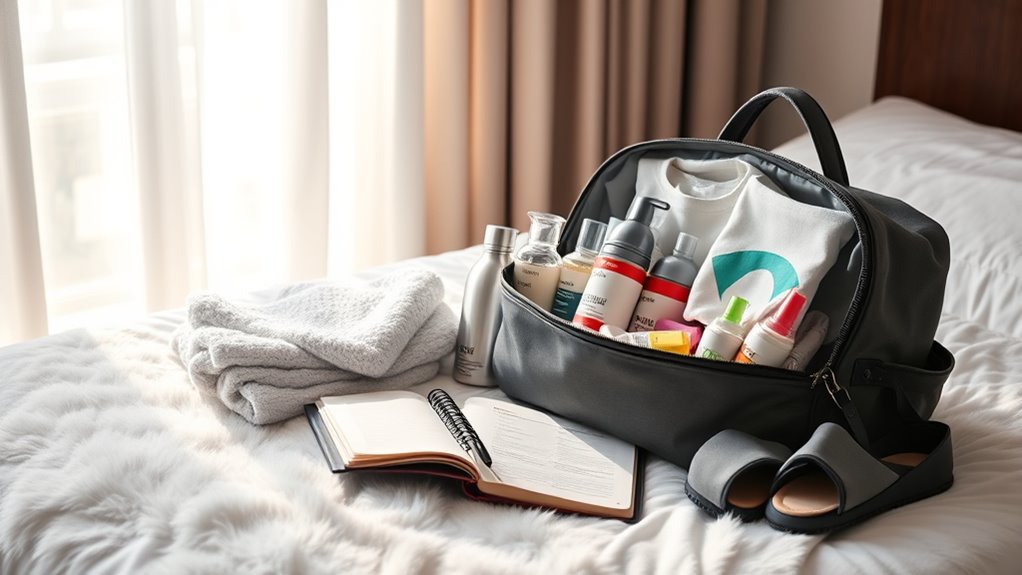Packing your hospital bag is vital for the big day! Aim to pack it between 36 and 38 weeks. For mom, include comfortable clothes, toiletries, chargers, and postpartum recovery items. Don’t forget baby essentials like outfits and a car seat. Your partner should pack snacks and a change of clothes. Streamline the process with a checklist to guarantee nothing’s forgotten. Want to know more about optional items and tips for packing? Keep exploring!
Key Takeaways
- Pack your hospital bag between 36 and 38 weeks of pregnancy for timely readiness.
- Include identification, insurance, comfortable clothing, and toiletries for your stay.
- Prepare a baby outfit, swaddling blankets, and an approved car seat for your newborn.
- Don’t forget snacks, drinks, and personal items for your partner during labor.
- Use a checklist to ensure you pack essentials and avoid unnecessary items.
When to Pack Your Hospital Bag
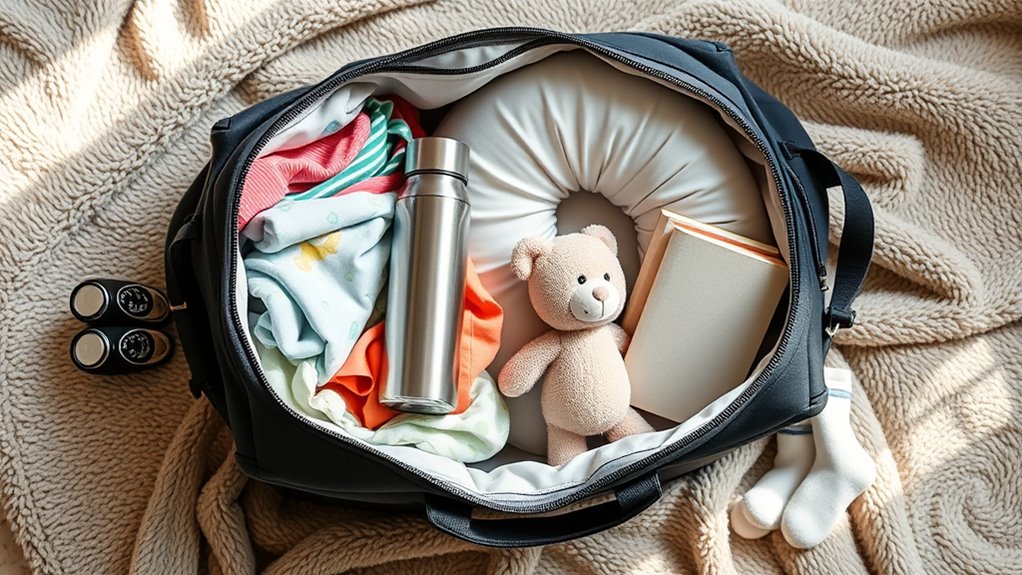
Packing your hospital bag between 36 and 38 weeks of pregnancy is a smart move to assure you’re ready for any surprises. Preparing in advance can help you feel more in control of your parenthood journey. If you’re in a high-risk pregnancy, you might want to pack your hospital bag as early as 35 weeks to accommodate possible complications. Aim to have your hospital bag ready by 38 weeks, so you can assure quick access when you notice those signs of labor. Additionally, understanding the importance of advance care planning can help ease your mind about the unexpected. Last-minute additions, like toiletries or snacks, can easily be included as your due date approaches without needing to repack everything. Keeping your bag in an easily accessible location, such as your car or near the front door, makes it simple to grab when the time comes. This preparation helps you stay calm and focused. Additionally, being aware of your emotional regulation can assist in managing any anxiety you may feel as your due date approaches.
Hospital Bag Checklist for Mom
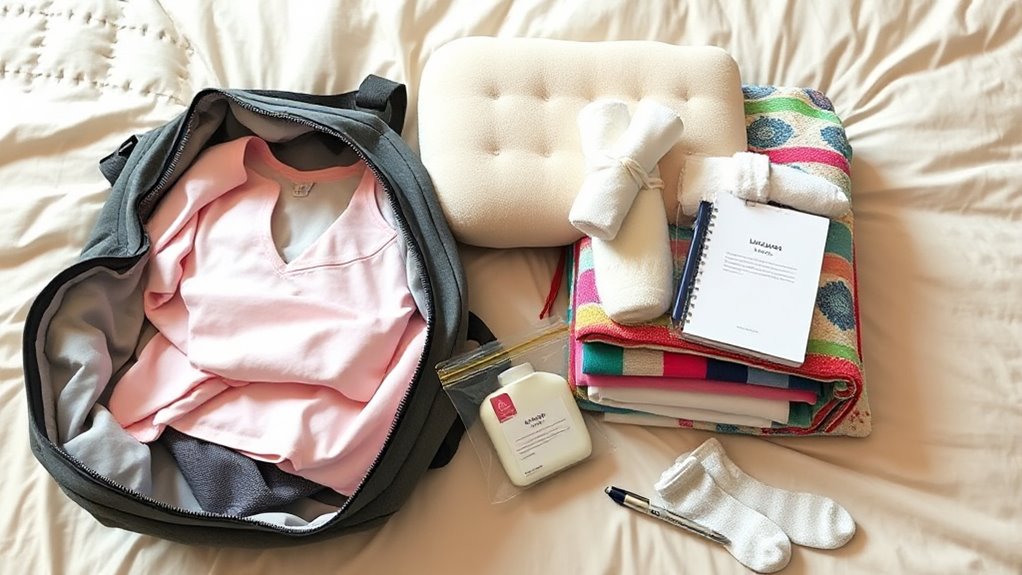
Your hospital bag checklist should guarantee you’re comfortable and prepared for both labor and postpartum recovery. Here are a few essentials to reflect on:
- Identification and insurance information
- Comfortable clothing, like nursing bras and a soft robe
- Toiletries, including travel-sized items for personal hygiene
Don’t forget to pack extra-long phone chargers and a power bank to stay connected and capture those precious moments. Additionally, ensuring you have packed a list of essentials for your newborn will help ease the transition into parenthood. It’s also wise to consider setting specific savings goals to help manage any unexpected expenses during this time.
Also, include postpartum recovery items like adult diapers and nipple cream for added comfort. It’s important to consider your physical healing and recovery time as you prepare for your hospital stay.
Preparing these essentials will help make your hospital experience smoother and more enjoyable.
Hospital Bag Checklist for Baby
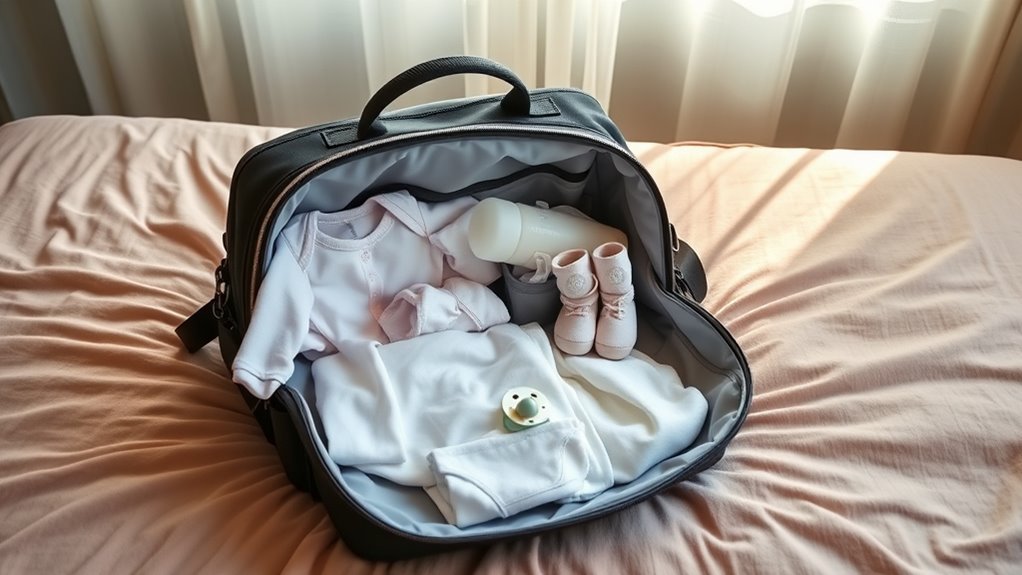
When packing your hospital bag for baby, you’ll want to include all the essential clothing items and safety gear. Think about the different sizes your little one might need for their coming-home outfit, and don’t forget that approved car seat for a safe ride home. Including items that meet nutrition awareness will help guarantee a smooth changeover from the hospital to your home. Additionally, consider adding expert advice on baby essentials to ensure you have everything you need for your new arrival. Remember to include items that support emotional wellbeing as they are crucial for your baby’s transition into the world.
Essential Baby Clothing Items
As you prepare for your baby’s arrival, packing essential clothing items for the hospital is crucial. Newborns need warmth, so having the right outfits on hand will ease your mind.
Here are a few must-haves to include in your hospital bag:
- Two coming-home outfits in different sizes
- Swaddling blankets for comfort and warmth
- Booties or socks to keep those tiny feet cozy
While hospitals often provide diapers, it’s still wise to pack a few newborn diapers just in case. Additionally, consider the importance of baby clothing essentials as you get ready for this significant transition.
Your baby will appreciate the soft fabrics and snug fit, making their first moments even more special. Being prepared with these essential items guarantees a smooth shift from the hospital to home.
Safety Gear Requirements
Packing safety gear is an essential step in guaranteeing a smooth shift from the hospital to home with your newborn.
First, make sure you have an approved infant car seat properly installed before your due date. This guarantees your baby is safe during the ride home. It should meet current safety standards and include head support for your newborn.
Don’t forget to pack a going-home outfit, including a hat for warmth, and consider bringing two in different sizes. Swaddling blankets are also great for keeping your baby cozy and soothing them during the ride.
While hospitals provide diapers and wipes, you might want to bring your preferred brand.
Finally, if you wear contact lenses, pack your solution for the hospital stay.
Hospital Bag Checklist for Partner

Creating a hospital bag checklist for your partner is essential for ensuring a smooth experience during labor. When you pack a hospital bag, consider these must-have items to keep your birth partner comfortable and energized:
- Snacks and drinks
- Personal toiletries
- Entertainment options
During labor and delivery, having snacks and drinks on hand is critical since hospital food mightn’t be available.
Having snacks and drinks readily available during labor is essential, as hospital food may not be accessible.
Don’t forget a change of clothes and personal toiletries for comfort during potentially long stays. A fully charged phone is important for capturing those unforgettable moments, while entertainment options like books or puzzles can help pass the time.
Finally, include a lightweight blanket to enhance comfort during overnight stays at the hospital.
Optional Hospital Bag Items for Mom

When it comes to your hospital bag, including a few optional items can greatly enhance your comfort and experience.
Consider packing personal toiletries like shampoo, conditioner, and makeup to help you feel fresh during your hospital stay. Extra-absorbent maxi pads can provide added comfort during postpartum recovery, while snacks are perfect for replenishing energy after labor, especially if meals are delayed.
Don’t forget entertainment items like books, puzzles, or games to help pass the time during labor and recovery. Bringing your favorite pillow or a lightweight blanket from home can make the environment feel cozier.
Together, these optional items will contribute to a more enjoyable and comfortable experience as you welcome your new baby.
Printable Hospital Bag Checklist
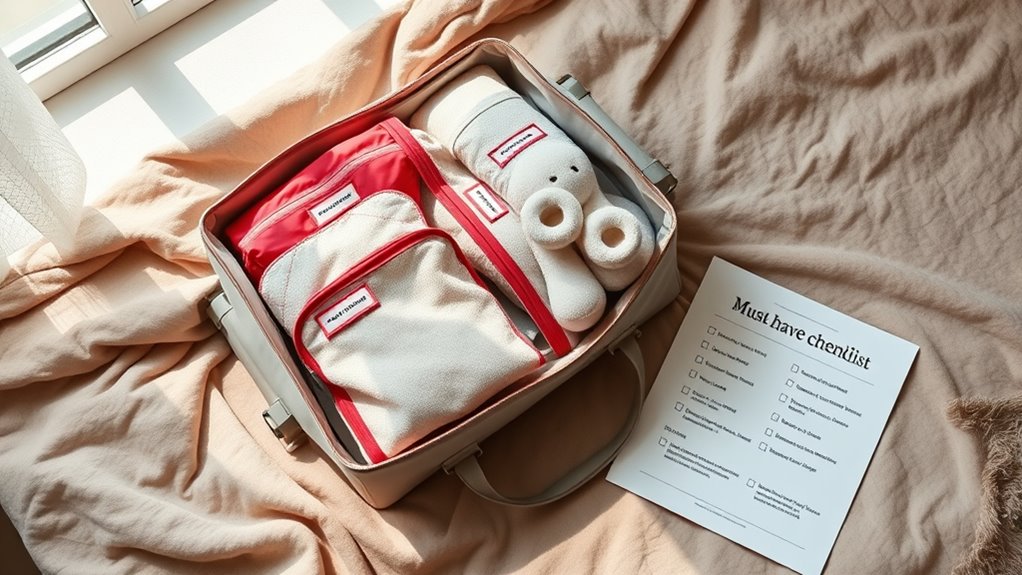
Having a printable hospital bag checklist makes packing a breeze and guarantees you won’t forget any essentials.
You can easily download one that serves as a complete guide for you, your baby, and your partner.
This way, you’ll feel more prepared as your due date approaches.
Easy Download Options
How can a printable hospital bag checklist make your packing process easier? Downloading a checklist not only organizes your essentials list but also enhances your preparedness as your due date approaches.
With categories tailored for labor, postpartum care, and comfort items for your partner, you can guarantee you won’t forget anything vital during this hectic time.
- Keep track of personal items you might need.
- Organize items based on labor and delivery essentials.
- Customize your checklist to fit your unique needs.
Complete Packing Guide
As you prepare for one of life’s most exciting moments, having a complete packing guide for your hospital bag can make a significant difference in your experience.
Start with essentials for yourself, like identification, insurance information, a birth plan, comfortable clothing, and toiletries.
For your baby, pack a car seat, an outfit for going home, and swaddling blankets.
Don’t forget your partner; they’ll need snacks, a change of clothes, toiletries, and maybe some entertainment to stay comfortable during your hospital stay.
To verify you’ve got everything, use a printable checklist to streamline your packing process.
Avoid unnecessary items like valuables or excessive clothing, as hospitals typically provide many essentials like diapers and wipes.
Frequently Asked Questions
What Do I Really Need to Pack in My Hospital Bag?
When you’re getting ready for your hospital stay, think about what’ll make you comfortable and prepared.
You’ll need comfortable clothing, toiletries, and a phone charger to stay connected. Don’t forget a birth plan if you have one.
For the baby, pack a going-home outfit and a car seat. Snacks and entertainment can help keep your partner occupied.
Consider adding personal items like a favorite pillow to make the experience more enjoyable.
What Should You Not Forget in a Hospital Bag?
You can’t afford to forget anything in your hospital bag!
First and foremost, grab your identification and insurance cards. They’re your golden tickets for smooth sailing.
Next, pack your birth plan—it’s your personal roadmap.
Don’t skimp on comfort; include cozy clothes for the ride home.
And please, toss in those essential toiletries to feel fresh.
Finally, make sure that car seat is ready; it’s a must for bringing your little one home safely!
What Food Should You Pack in Your Hospital Bag?
When you’re deciding what food to pack in your hospital bag, think about easy-to-eat snacks. Granola bars, nuts, and dried fruit are great for keeping your energy up.
Don’t forget a reusable water bottle to stay hydrated, too! Opt for low-sugar, high-protein snacks like yogurt or cheese sticks.
Avoid perishable items, and check with the hospital about their food policies before packing anything. You want to be prepared!
How Many Weeks Pregnant Should You Pack Your Hospital Bag?
You might think it’s too early to worry about packing your hospital bag, but you’ll want to be prepared.
Ideally, you should pack between 36 and 38 weeks of pregnancy to guarantee you’re ready for any surprises. If you have a high-risk pregnancy, starting as early as 35 weeks is wise.
This way, you can relax and add anything last-minute as your due date approaches, making the experience less stressful for you.
Conclusion
As you prepare to welcome your little one, packing your hospital bag isn’t just a task; it’s a rite of passage. Imagine each item as a stepping stone on your journey into parenthood, ready to guide you through this life-changing experience. With essentials in tow, you’re not just bringing supplies, but also your hopes and dreams for the future. So, zip up that bag with confidence, and let this adventure unfold—one heartbeat at a time.
